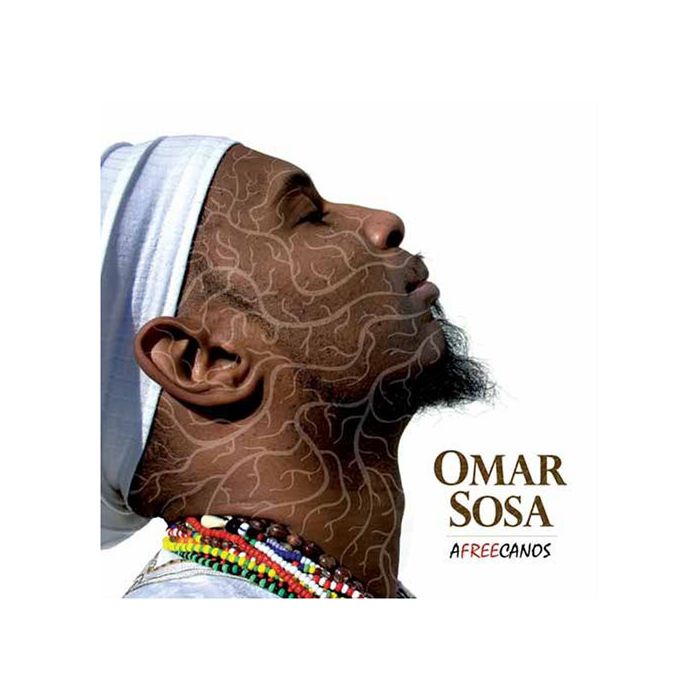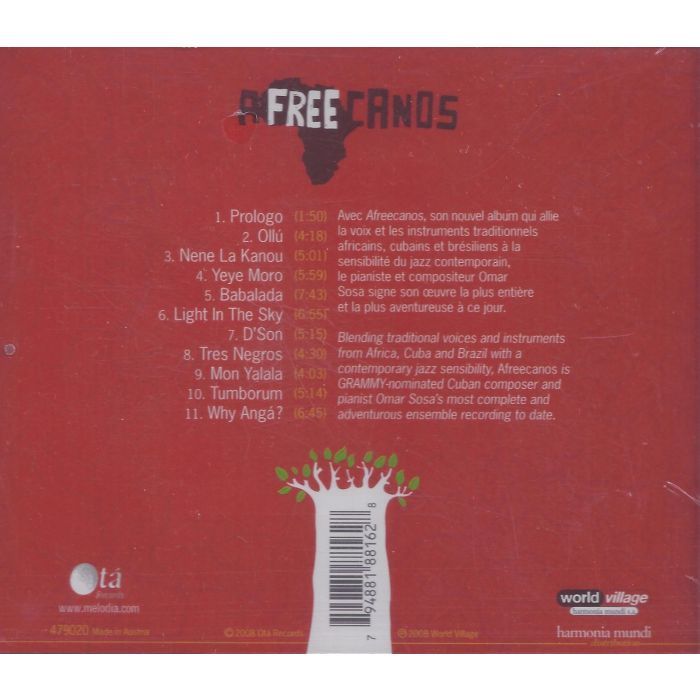
(Produkt nie został jeszcze oceniony)
tytuł
Omar Sosa: Afreecanos
wykonawcy
Sosa, Omar
nr katalogowy
WV 479020
opis
With every passing year, pianist Omar Sosa continues to define what contemporary world music can be. Each effort is quite different than the previous one, while the bright colors, timbres, and elements of his Cuban-based music are elevated higher and higher. In his restlessness to find further truth and beauty, there's a calm serenity and unabashed confidence in his vision and personal musicianship.
For Afreecanos, Sosa uses artists from every portion of the globe except Australia and Canada, though some have lived there, too. They include fellow Cubans Orestes Vilató on timbales and flutist/saxophonist Leandro Saint-Hill; trumpeters Bill Ortiz (U.S.A.) and Stephane Belmondo (France); Africans Mola Sylla, Fanta and Baba Sissoko, and (from Morocco) violinist Mohamed Soulimane -- as well as Brazilian vocalists and the American-based bata player Michael Spiro. As you can imagine, this melting pot of rhythmic, vocal, and instrumental sound blends into a potpourri that makes refreshingly new music within ritual and traditional frameworks.
There are many highlights: the heavy staccato-laden worldbeat groove blues of "Ollú," the jazz-oriented horn charts and singsong or harder-edged but lighthearted "D'Son" and "Tres Negroes," the effortless and funky African-derived "Tumborum," the flute-fronted oceanic-cum-Yoruban "Light in the Sky," and the sorrowful, more question than answer-oriented "Why Anga?," for the late conga player Miguel "Angá" Diaz, who played with Sosa up until his untimely passing. You'll hear straight African chants, spirit songs, and a ballad or two, the 21-stringed kora featured on the entirely beautiful "Iyade," and an occasional piano interlude from Sosa. As time goes by, with his music featuring fully developed progress-oriented themes, you notice less of Sosa as an individual voice and more in an image as a team player or village chieftain. In fact, the group singing is more prevalent than his individual playing.
Omar Sosa continues to make brilliant music where the natural and spiritual meet the contemporary. He continues to set the bar further up into the stratosphere, and one can only imagine how far he's going to reach. This is a major artist on the international scene who all should be paying close attention to. • Michael G. Nastos, Rovi
For Afreecanos, Sosa uses artists from every portion of the globe except Australia and Canada, though some have lived there, too. They include fellow Cubans Orestes Vilató on timbales and flutist/saxophonist Leandro Saint-Hill; trumpeters Bill Ortiz (U.S.A.) and Stephane Belmondo (France); Africans Mola Sylla, Fanta and Baba Sissoko, and (from Morocco) violinist Mohamed Soulimane -- as well as Brazilian vocalists and the American-based bata player Michael Spiro. As you can imagine, this melting pot of rhythmic, vocal, and instrumental sound blends into a potpourri that makes refreshingly new music within ritual and traditional frameworks.
There are many highlights: the heavy staccato-laden worldbeat groove blues of "Ollú," the jazz-oriented horn charts and singsong or harder-edged but lighthearted "D'Son" and "Tres Negroes," the effortless and funky African-derived "Tumborum," the flute-fronted oceanic-cum-Yoruban "Light in the Sky," and the sorrowful, more question than answer-oriented "Why Anga?," for the late conga player Miguel "Angá" Diaz, who played with Sosa up until his untimely passing. You'll hear straight African chants, spirit songs, and a ballad or two, the 21-stringed kora featured on the entirely beautiful "Iyade," and an occasional piano interlude from Sosa. As time goes by, with his music featuring fully developed progress-oriented themes, you notice less of Sosa as an individual voice and more in an image as a team player or village chieftain. In fact, the group singing is more prevalent than his individual playing.
Omar Sosa continues to make brilliant music where the natural and spiritual meet the contemporary. He continues to set the bar further up into the stratosphere, and one can only imagine how far he's going to reach. This is a major artist on the international scene who all should be paying close attention to. • Michael G. Nastos, Rovi
nośnik
CD x 1
wydawca
World Village
data wydania
9.06.2008
EAN / kod kreskowy
794881881628
45,00 zł
Produkt dostepny w niewielkiej ilości.
Wysyłka w ciągu 3 dni roboczych
Darmowa wysyłka dla zamówień powyżej 300 zł!
Darmowy kurier dla zamówień powyżej 500 zł!
sprawdź koszty wysyłki